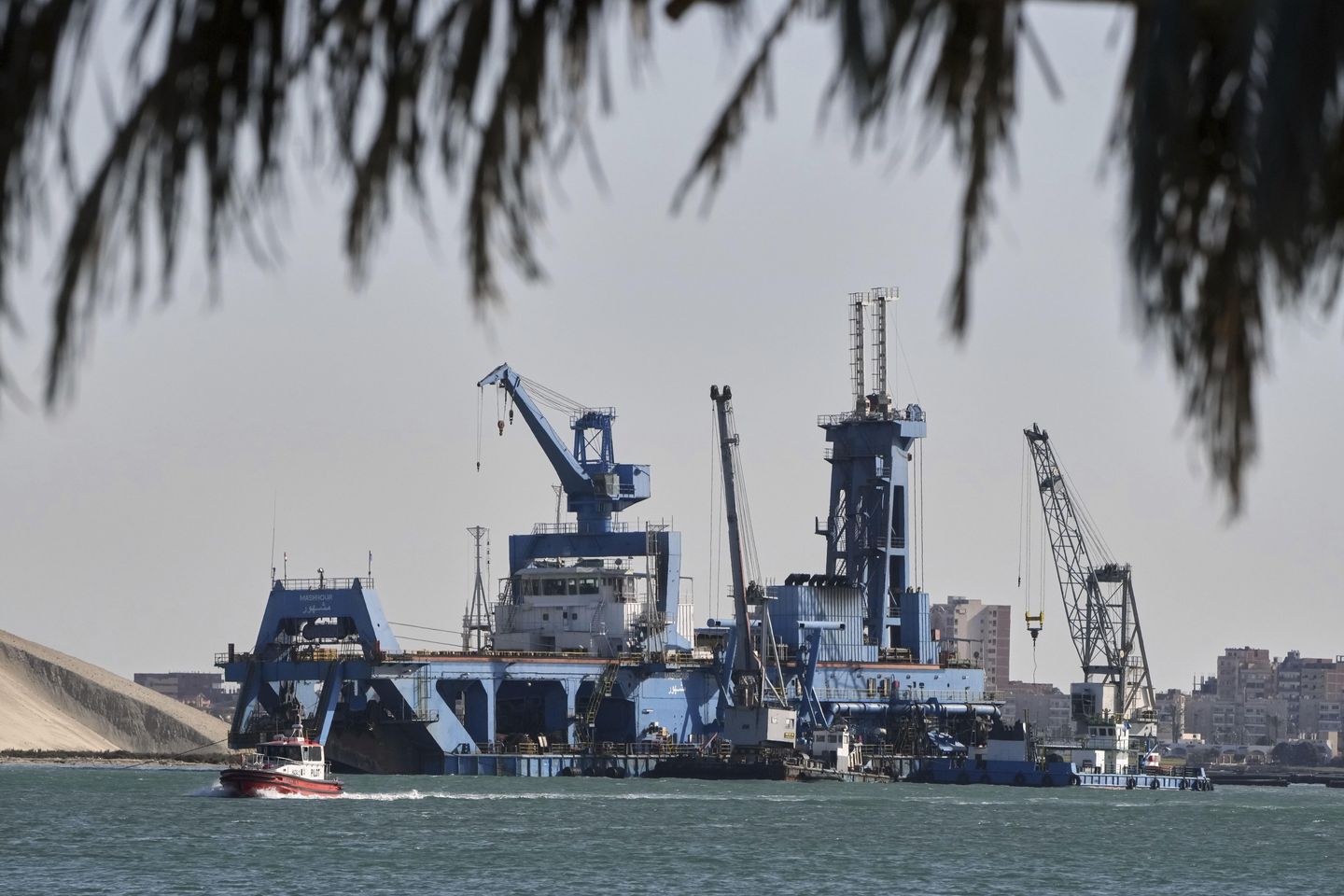
CAIRO — In Saudi Arabia and Qatar, President Trump has basked this week in lavish welcome ceremonies and signed eye-popping deals. But in nearby Egypt, Arab leaders are decidedly more skeptical about the American president’s interest in the region — especially in the wake of last month’s remarks about the Suez Canal.
The president in an April 26 social media post said “American ships, both military and commercial, should be allowed to travel, free of charge, through the Panama and Suez canals!”
The comment set off alarms in Egypt, where leaders are negotiating the purchase of upgraded submarines from China and other suppliers as part of an effort to add naval muscle in the Red Sea and could reduce Egyptian dependence on the U.S. and a Trump administration seen by some as too unpredictable.
A priority is protecting the sovereignty of the Suez Canal at a time when revenues have plummeted, from a record $10.25 billion in 2022 to under $4 billion last year due to Houthi attacks in the Red Sea.
“That income funds everything from food subsidies to arms procurement,” said Mohamed Nabil El Bendary, a political researcher at Interregional for Strategic Analysis in Cairo. “So any suggestion the canal should be open to U.S. warships free of charge strikes a nerve.”
Behind closed doors, Egyptian security figures are interpreting Mr. Trump’s remarks as a signal that traditional U.S. guarantees can no longer be taken for granted.
A senior source close to Egypt’s arms procurement community told The Washington Times that the country is finalizing plans to replace its aging Chinese Romeo-class submarines, last upgraded in the 1980s, with a fleet of at least 12 modern stealth-capable vessels. Four German-built Type 209s are already in service. Cairo now aims to acquire at least eight more from Spain and China.
“We’ve always had 12 boats,” the source said. “We’re just replacing the old ones. Israel’s got its advantage — we need our own.”
He added that Washington should recognize shifting regional dynamics. “The law guaranteeing Israel a qualitative military edge worked when Arabs had no alternatives. But now we do. If America blocks sales, we’ll buy from China or Europe. It’s not a threat — it’s economics.”
Publicly, Egyptian officials present a more measured stance.
Mr. El Bendary said Mr. Trump’s Suez remarks were not seen as the root cause of Egypt’s naval modernization, which began more than a decade ago. Still, he acknowledged they have stirred anxieties. “Trump’s comments raised three concerns: economic risk if they become policy, a dangerous precedent for future demands, and a direct affront to national sovereignty,” he said. “They amplified a drive already underway.”
That drive is visible in Egypt’s leadership of Combined Task Force 153, a multinational maritime security mission in the Red Sea, and in a series of high-profile naval exercises with NATO partners. Egypt, Mr. El Bendary noted, is aiming to secure trade corridors from the Bab el-Mandeb Strait to the Eastern Mediterranean.
Israel, too, is watching closely.
The Dolphin-class submarines Israel operates are equipped with AIP systems and are rumored to have second-strike nuclear capabilities. Egypt’s new platforms would aim to close that gap. While Israel’s submarines outclass Egypt’s current fleet, the Chinese Type 039A would represent a substantial upgrade.
Recent reporting confirms that Egypt is now in final negotiations to acquire several Type 039A submarines from China, with the deal reportedly including technology transfer and local production rights. The move would mark a significant shift in Egypt’s procurement posture, further distancing it from reliance on U.S. military aid and Western suppliers. China, for its part, has been actively marketing the submarine in the region.
The regional submarine landscape is evolving around the globe.
Pakistan in March launched its second Hangor-class submarine, PNS/M Shushuk, at a ceremony in Wuhan, China. This event is part of an eight-vessel agreement signed in 2015 between Pakistan’s Ministry of Defense and China.
Equipped with advanced stealth features and air-independent propulsion systems, the Hangor-class submarines are designed to bolster Pakistan’s deterrence capabilities in the Indian Ocean.
The development underscores a broader trend of regional powers enhancing their undersea warfare capabilities, potentially altering the strategic dynamics in the Middle East and South Asia.
Brent Sadler, a former U.S. Navy officer and senior fellow at The Heritage Foundation, said Mr. Trump’s remarks should not be underestimated.
“It may have resonated politically in the U.S., but in Egypt it was received as a direct challenge to sovereignty,” he said. “Moves like this accelerate hedging behavior — driving longtime partners toward suppliers like China and Russia.”
But Amira Oron, Israel’s former envoy to Cairo and now a senior fellow at Tel Aviv’s Institute for National Security Studies, said the concerns about Egypt’s military expansion are often exaggerated.
“Egypt’s military is modernizing — not mobilizing,” Ms. Oron told The Washington Times. “The narrative that Cairo is preparing for war is baseless and damaging. It’s fueled by speculation, some of it amplified by foreign actors.”
She said that Egypt’s diversification in arms procurement began after the Arab Spring, when U.S. transfers stalled and Egypt began buying from France and Germany. “Now it’s China. It’s about resilience,” she said.
Ms. Oron cited data from the Stockholm International Peace Research Institute showing that Egypt reduced arms imports by 20% in 2023-24 even as it finalized deals for submarines, frigates, and fighter jets. “There’s a logic here: If you’re serious about deterrence, you train, you upgrade and you partner. And that’s what Egypt’s been doing — including with NATO allies.”
Still, she acknowledged that nationalist sensitivities were inflamed by Mr. Trump’s remarks. “The Suez Canal and Sinai are red lines — paid for in blood.”
The Egyptian source close to procurement said the Chinese Type 039A is not just a symbolic purchase. With AIP systems allowing extended submerged operations and anti-ship missiles that reach 125 miles, it gives Egypt new options.
He confirmed that Egypt is negotiating for co-production rights and local assembly. “The real value is in the tech-transfer. If we can build this sub here, we can sell it elsewhere.”
But operating a hybrid fleet brings its own complications. Mr. Sadler cautioned that using both Chinese and Western military systems in the same navy risks compromising U.S. and allied capabilities.
“If a Chinese submarine is integrated with Western sensors or weapons, you create openings for intelligence breaches,” he said. “That’s a real concern.”
He warned that the U.S. may respond with limits on assistance. “If Egypt buys Chinese subs, you can expect U.S. military aid to be curtailed.”
Still, Mr. Sadler said Washington needs to adapt. He advocated for “reciprocity” and clearer articulation of U.S. interests to guide future defense partnerships. “Egypt is at a deciding point,” he said, “and while shared interests with the West are likely to keep it aligned, clear diplomacy and unambiguous statements of intent are required by Egypt as well.”
He added that while Egypt leaning toward China is a real possibility, “this doesn’t consider the negative reaction of European powers and markets,” which could make such a shift less likely.
For now, Egypt is moving ahead. After its first joint air exercises with China last year, Cairo is preparing for naval drills. The submarine in question may soon make a port call in Alexandria.
“They’ve been trying to sell us this sub for over a decade,” the Egyptian source said. “We didn’t want to upset the Americans. That era is over.”












